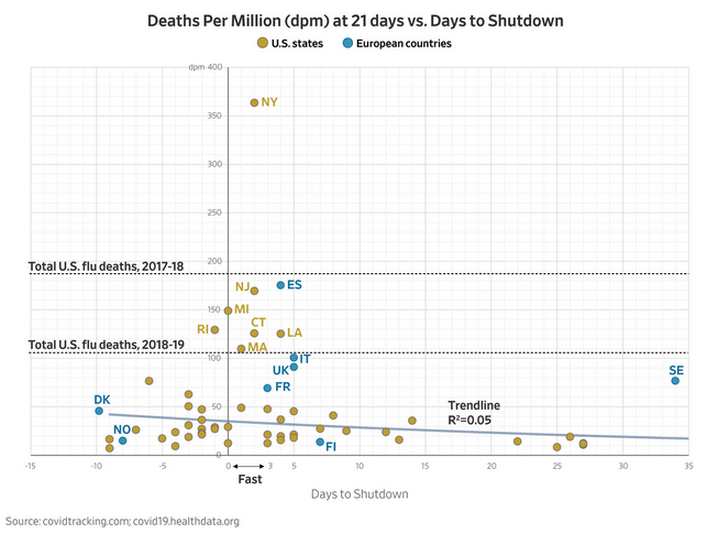Lockdowns Don’t Seem to Save Many Lives in Most Places, New Data Shows

As many cities around the world are still in a lockdown mode due to the deadly coronavirus, the United States has lost over 22 million jobs. Is the shutdown of US economy a $3 trillion mistake? New data suggests that might be the case. According to a new study published in Wall Street Journal, the ongoing lockdowns seem not to have saved many lives in most places. Their data also show that the speed with which officials shuttered the economy appears not to be a factor in Covid deaths.
Unlike Sweden, which is fighting coronavirus with common-sense guidelines that are much less economically destructive than the lockdowns in most U.S. states, most mayors and governors in the United States issued a more draconian measure, which may not be backed by science or supported by any empirical data.
The study, which was conducted by T.J. Rodgers (founding CEO of Cypress Semiconductor Corp), Joe Malchow, and Yinon Weiss, found that quick shutdowns may not work in the fight against the spread of Covid-19. They ran a simple one-variable correlation of deaths per million and days to shutdown, which ranged from minus-10 days (some states shut down before any sign of Covid-19) to 35 days for South Dakota, one of seven states with limited or no shutdown.

The correlation coefficient was 5.5%. The trendline sloped downward—states that delayed more tended to have lower death rates, which as the authors say, is also a meaningless result due to the low correlation coefficient. The authors drew “no conclusions about the states that sheltered quickly, because their death rates ran the full gamut, from 20 per million in Oregon to 360 in New York. This wide variation means that other variables—like population density or subway use—were more important.”
“Our correlation coefficient for per-capita death rates vs. the population density was 44%. That suggests New York City might have benefited from its shutdown—but blindly copying New York’s policies in places with low Covid-19 death rates, such as my native Wisconsin, doesn’t make sense,” the Rodgers said.
“We should cheer for Sweden to succeed, not ghoulishly bash them. They may prove that many aspects of the U.S. shutdown were mistakes—ineffective but economically devastating—and point the way to correcting them,” Rodgers concluded.




